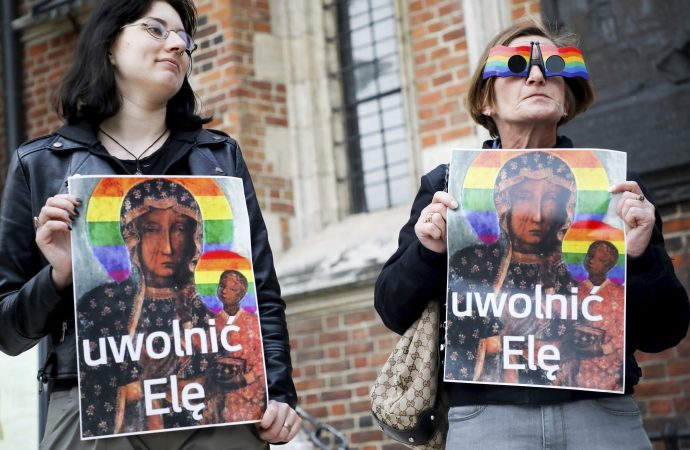Following weeks of escalating tensions between Polish bishops and the country’s LGBT community, the head of Poland’s Catholic episcopal conference has said homosexual people must be treated with respect, but he called on lawmakers to uphold marriage as between a man and a woman.
In an Aug. 8 statement, Archbishop Stanislaw Gądecki, president of the Polish bishops’ conference, issued an appeal to the nation’s authorities, urging them “not to make decisions that - under the guise of counteracting discrimination - would conceal the ideology that denies the natural gender difference and complementarity between men and women.”
“I also appeal to parliamentarians to resist the far-reaching plans of (the) LGBT+ milieus, that aim to change Polish law in order to introduce the so-called ‘homosexual marriage’ and the possibility of adoption (of) children by them.”
Referring to heightened tensions between the Catholic Church and the LGBT community in Poland, Gądecki said recent criticisms of those expressing disapproval of the “LGBT+ ideology” are a testament to “the ideological totalitarianism rooted in certain milieus, consisting in removing people who think differently outside the sphere of freedom.”
“Therefore, I appeal to all people of good will to apply the principle of non-discrimination in public discussion not only to the supporters of the mentioned ideology, but also to allow its opponents on equal rights to debate,” he said.
Gądecki's comments come in the wake of weeks of hostile exchanges between Poland’s Catholic leaders and those who sympathize with the LGBT agenda following last month’s “Equality March” in Bialystok.
Archbishop Tadeusz Wojda, who oversees the Bialystok archdiocese, issued a statement ahead of the July 20 march saying the event “insulted Christian values, profaned sacred symbols and uttered blasphemies against God,” adding that the march was “an initiative alien to our land and society” and “an act of discrimination against Catholics.”
Critics blamed Wojda for inciting violent protests of the march, during which protesters reportedly hurled bottles and rocks, and spat at the 800 participants, calling them “perverts.” Police used stun grenades and pepper spray to hold protesters back, arresting around 20 people.
LGBT groups have often complained of discrimination in Poland, which currently has a population of around 38 million, roughly 86 percent of whom identify as Roman Catholic. In 2016, the Polish parliament killed a bill that would have allowed violence against people because of gender, gender identity, sexual orientation, disability, and age to be possible grounds for a “hate crime.”
In a statement following the march, Wojda said that “Acts of violence and scorn are incompatible with the attitude of a Christian and disciple of Christ.”
Yet at the same time, he urged Catholics to pray and care for the family and “its internal purity, so our families, strong in God, can offer an example of beautiful love in the pattern of the Holy Family. These latest incidents show we still have much to do.”
In a statement issued July 21, the day after the march, the spokesman for the Polish bishops’ conference, Father Pawel Rytel-Andrianik, said the Catholic Church would continue to condemn the “deadly sin” of homosexuality, while “unequivocally disapproving” of violence.
Since the march, Polish bishops, facing increased pressure over LGBT issues, have decried attacks made on clergy and Catholic places of worship.
On July 28, Father Aleksander Ziejewski was assaulted in the sacristy of the Basilica of St. John the Baptist, located in the northern city of Szczecin. Three men were arrested in connection with the crime, during which they allegedly demanded vestments for a same-sex wedding, according to police.
The assault followed several other incidents, including the stabbing of a priest at a church in Wroclaw and the parodying of Catholic rites and images of Mary by LGBTQ sympathizers in numerous cities, including Czestochowa, Gdansk and Krakow.
In addition, somewhere around a dozen Catholic churches have been desecrated throughout Poland in the past two months, according to the Krakow-based Polonia Christiana association.
Tensions soared again last week when during a homily to mark the 75th anniversary of the Warsaw Uprising, Archbishop Marek Jƒôdraszewski of Krakow called LGBT ideology a “rainbow-colored plague” - a comment that sparked protests outside of the city’s cathedral.
In his Aug. 8 statement, GƒÖdecki lamented that the summer holiday, which ought to be a time of rest, was instead a time when “polemics arose.”
“This is probably related to the offensive of LGBT+ milieus and a significant increase in the number of so-called pride marches organized in our country,” he said, and also pinned blame on a proposal put forward by some local governments to introduce a new approach to sexual education into school curricula after the holiday.
Gądecki insisted that homosexual individuals “are our brothers and sisters for whom Christ gave his life and whom He wants also to be saved,” however, he stressed that respect for people “cannot… lead to the acceptance of an ideology that aims to revolutionize social customs and interpersonal relationships.”
Quoting Pope Francis, he said that “this revolution of customs and morals…has often waved the flag of freedom,” but in reality, it has “brought spiritual and material devastation to countless human beings, especially the poorest and most vulnerable.”

